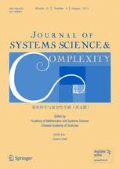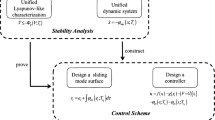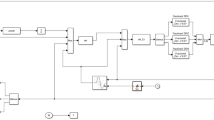Abstract
An event-triggered control (ETC) system transmits data packages and updates control inputs only when the predefined criterion is satisfied. In this way, network communication and computing resources are scheduled more reasonably in contrast to the traditional periodic sampling strategy. Small-gain approach proposed in recent literatures is a new modeling method to deal with nonlinear ETC systems. Different from traditional ETC models, stability criteria are proposed in the form of input to state stability (ISS) gain to design the triggering mechanisms. This paper introduces additional dynamic variables in this model and proposes a small-gain based dynamic event-triggered strategy. Sufficient conditions to guarantee the stability of the system are derived with the help of cyclic-small-gain theorem and Zeno behaviors are avoided to ensure the feasibility of this method in practical applications. Numerical simulations are given to demonstrate the effectiveness of our approach.
Similar content being viewed by others
References
Astrom K and Wittenmark B, Computer Controlled Systems: Theory and Design, Prentice-Hall Englewood Cliffs, New Jersey, 1982.
Franklin G, Workman M, and Powell D, Digital Control of Dynamic Systems, Addison-Wesley, Boston, 2001.
Zhang W, Branicky M, and Phillips S, Stability of networked control systems, IEEE Control Systems Magazine, 2001, 21(1): 84–99.
Guan X, Xu Z, Jia Q, et al., Cyber-physical model for efficient and secured operation of CPES or energy Internet, Science China (Information Sciences), 2018, 61(11): 1–3.
Zhao M, Liu H, and Li Z, Fault tolerant control for networked control systems with packet loss and time delay, International Journal of Automation and Computing, 2011, 1(2): 100–109.
Hendricks E, Jensen M, Chevalier A, et al., Problems in event based engine control, American Control Conference (ACC), Baltimore, 1994.
Astrom K and Bernhardsson B, Comparison of periodic and event based sampling for first-order stochastic systems, Proceedings of Ifac World Congress, Beijing, 1999.
Arzen K, A simple event-based PID controller, Proceedings of Ifac World Congress, Beijing, 1999.
Heemels W, Gorter R, Zijl A, et al., Asynchronous measurement and control: A case study on motor synchronization, Control Engineering Practice, 1999, 7(12): 1467–1482.
Abdelrahim M, Postoyan R, Daafouz J, et al., Stabilization of nonlinear systems using event-triggered output feedback controllers, IEEE Transactions on Automatic Control, 2014, 61(9): 2682–2687.
Borgers D, Dolk V, and Heemels W, Riccati-based design of event-triggered controllers for linear systems with delays, IEEE Transactions on Automatic Control, 2017, 63(1): 174–188.
Heemels W, Donkers M, and Teel A, Periodic event-triggered control for linear systems, IEEE Transactions on Automatic Control, 2013, 58(4): 847–861.
Wang Z, Sun J, and Chen J, Stability analysis of event-triggered networked control systems with time-varying delay, China Control Conference (CCC), Hangzhou, 2015.
Garcia E and Antsaklis P, Model-based event-triggered control with time-varying network delays, IEEE Conference on Decision and Control (CDC) and European Control Conference (ECC), Orlando, 2012.
Hu S and Yue D, ℒ2-Gain analysis of event-triggered networked control systems: A discontinuous Lyapunov functional approach, International Journal of Robust and Nonlinear Control, 2013, 23(11): 1277–1300.
Wang H, Shi P, Lim C, et al., Event-triggered control for networked Markovian jump systems, International Journal of Robust and Nonlinear Control, 2015, 25(17): 3422–3438.
Wang X and Lemmon M, Event design in event-triggered feedback control systems, IEEE Conference on Decision and Control (CDC), Cancun, 2008.
Miskowicz M, Send-on-delta concept: An event-based data reporting strategy, Sensors, 2006, 6(1): 49–63.
Lunze J and Lehmann D, A state-feedback approach to event-based control, Automatica, 2010, 46(1): 211–215.
Zou L, Wang Z, and Zhou D, Event-based control and filtering of networked systems: A survey, International Journal of Automation and Computing, 2017, 14(3): 239–253.
Tabuada P, Event-triggered real-time scheduling of stabilizing control tasks, IEEE Transactions on Automatic Control, 2007, 52(9): 1680–1685.
Jiang Z and Liu T, A survey of recent results in quantized and event-based nonlinear control, International Journal of Automation and Computing, 2015, 12(5): 455–466.
Donkers M and Heemels W, Output-based event-triggered control with guaranteed ℒ∞-gain and improved and decentralized event-triggering, IEEE Transactions on Automatic Control, 2012, 57(6): 1362–1376.
Zhu W, Zhou Q, Wang D, et al., Fully distributed consensus of second-order multi-agent systems using adaptive event-based control, Science China (Information Sciences), 2018, 61(12): 199–201.
Davo M, Prieur C, and Fiacchini M, Stability analysis of output feedback control systems with memory-based event-triggering mechanism, IEEE Transactions on Automatic Control, 2017, 62(12): 6625–6632.
Chen X and Hao F, Periodic event-triggered state-feedback and output-feedback control for linear systems, International Journal of Control Automation and Systems, 2015, 13(4): 779–787.
Tallapragada P and Chopra N, Decentralized event-triggering for control of nonlinear systems, IEEE Transactions on Automatic Control, 2014, 59(12): 3312–3324.
Liu T and Jiang Z, A small-gain approach to robust event-triggered control of nonlinear systems, IEEE Transactions on Automatic Control, 2015, 60(8): 2072–2085.
Liu T, and Jiang Z, Event-based control of nonlinear systems with partial state and output feedback, Automatica, 2015, 53: 10–22.
De Persis C, Sailer R, and Wirth F, Parsimonious event-triggered distributed control: A Zeno free approach, Automatica, 2013, 49(7): 2116–2224.
Girard A, Dynamic triggering mechanisms for event-triggered control, IEEE Transactions on Automatic Control, 2015, 60(7): 1992–1997.
Postoyan R, Tabuada P, Nesic D, et al., A framework for the event-triggered stabilization of nonlinear systems, IEEE Transactions on Automatic Control, 2015, 60(4): 982–996.
Seuret A and Prieur C, Event-triggered sampling algorithms based on a Lyapunov function, IEEE Conference on Decision and Control (CDC) and European Control Conference (ECC), Orlando, 2011.
Jiang Z and Wang Y, A generalization of the nonlinear small-gain theorem for large-scale complex systems, World Congress on Intelligent Control and Automation, Chongqing, 2008.
Liu T, Hill D, and Jiang Z, Lyapunov formulation of ISS cyclic-small-gain in discrete-time dynamical networks, Automatica, 2011, 47(9): 2088–2093.
Sontag E, Input to State Stability: Basic Concepts and Results, Springer, Berlin Heidelberg, 2008.
Sontag E and Wang Y, On characterizations of the input-to-state stability property, Systems and Control Letters, 1995, 24(5): 351–359.
Khalil H, Nonlinear Systems, 3rd Edition, Prentice Hall, Upper Saddle River, New Jersey, 2002.
Author information
Authors and Affiliations
Corresponding author
Additional information
This research was supported by the National Natural Science Foundation of China under Grant Nos. 61522303, U1509215, 61621063, Program for Changjiang Scholars and Innovative Research Team in University under Grant No. IRT1208, Youth ChangJiang Scholars Program, National Outstanding Youth Talents Support Program.
This paper was recommended for publication by Editor LIU Guoping.
Rights and permissions
About this article
Cite this article
Zhao, Q., Sun, J. & Bai, Y. Dynamic Event-Triggered Control for Nonlinear Systems: A Small-Gain Approach. J Syst Sci Complex 33, 930–943 (2020). https://doi.org/10.1007/s11424-020-9210-0
Received:
Revised:
Published:
Issue Date:
DOI: https://doi.org/10.1007/s11424-020-9210-0




